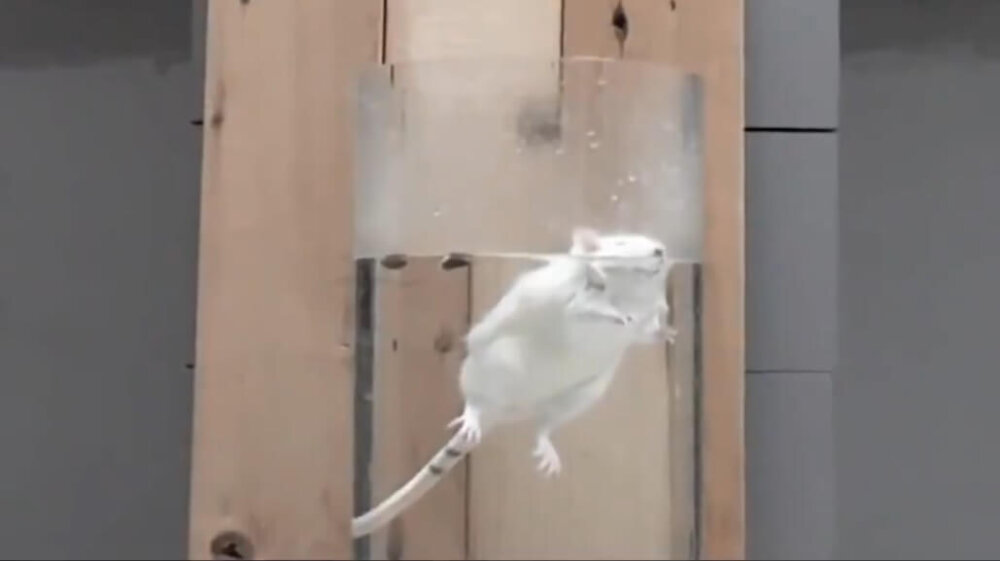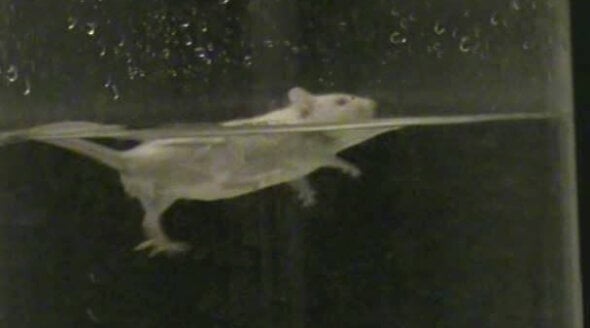PETA Scientists Reveal Step-by-Step Plan for Ending Cruel Near-Drowning Test on Animals
PETA scientists are once again leading the charge against scientifically unfit experiments on animals. This time, their new paper tackles two of the most thoughtless pharmaceutical tests that make mice and rats fear for their lives in inescapably terrifying situations.
In the paper, published in esteemed journal Regulatory Toxicology and Pharmacology, PETA scientists and advocates from around the globe teamed up to provide real-world guidance for stopping the forced swim test, in which animals swim for their lives in beakers of water, and the tail suspension test, in which animals are hung upside down by their sensitive tails.
These experiments are not only cruel but also bad science. They consistently fail to provide reliable results about which drugs can help humans, yet they are commonly used by pharmaceutical companies to test antidepressants.
PETA vs Cruel and Unreliable Science
Headed by lead author PETA US neuroscientist Dr Emily Trunnell, the new paper, titled “The Need for Guidance in Antidepressant Drug Development: Revisiting the Role of the Forced Swim Test and Tail Suspension Test”, presents a collaborative effort between scientists and advocates from PETA entities in the US, UK, and Germany as well as the Physicians Committee for Responsible Medicine, Animal-Free Science Advocacy, and the New Zealand Anti-Vivisection Society.
The article pushes a watertight case for ending the pharmaceutical industry’s use of the forced swim and tail suspension tests by providing actionable steps to the International Council for Harmonisation of Technical Requirements for Pharmaceuticals for Human Use (ICH). This influential council issues guidance for regulatory agencies and pharmaceutical companies, including the UK Medicines & Healthcare products Regulatory Agency.
Better Guidelines for Animal-Free Research
Some regulators now encourage pharmaceutical companies to pursue superior animal-free testing methods for new drug submissions, but clear guidance against the use of the worthless forced swim and tail suspension tests does not exist. General guidelines are also needed for testing drugs’ effectiveness before they reach human trials.
To fix this, the paper urges the ICH to take the following actions:
- Establish a working group to examine whether tests like forced swimming and tail suspension are fit-for-purpose, suggest standards for testing the effectiveness of drugs before they get to human trials, and suggest non-animal alternatives that pharmaceutical companies can use instead.
- Accept public comments on the working group’s recommendations.
- Use the above information to develop policies and guidelines for testing whether psychiatric drugs may be effective for humans.
Following discussions with PETA entities around the world, 15 companies and over a dozen top UK universities, including King’s College London, ended their use of the forced swim test.
The Home Office recently came one step closer to completely eliminating the forced swim test in the UK: Lord Sharpe of Epsom, parliamentary under-secretary of state for the Home Office, accepted the Animals in Science Committee’s advice to ban the use of this scientifically flawed test as a model of human depression or for studies of anxiety and its treatment.
Help End the Forced Swim Test
All uses of this experiment must be banned. Please take these three steps to help mice and rats used in the forced swim test:





